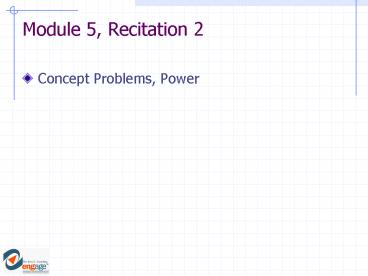Module 5, Recitation 2 - PowerPoint PPT Presentation
1 / 9
Title:
Module 5, Recitation 2
Description:
Title: EF 151 Module 5 Recitations Author: Will Schleter and Dick Bennett Last modified by: Richard Bennett Created Date: 5/29/2005 1:33:01 PM Document presentation ... – PowerPoint PPT presentation
Number of Views:66
Avg rating:3.0/5.0
Title: Module 5, Recitation 2
1
Module 5, Recitation 2
- Concept Problems, Power
2
ConcepTest Time for Work I
- Mike applied 10 N of force over 3 m in 10
seconds. Joe applied the same force over the
same distance in 1 minute. Who did more work?
1) Mike 2) Joe 3) both did the same work
3
ConcepTest Time for Work I
- Mike applied 10 N of force over 3 m in 10
seconds. Joe applied the same force over the
same distance in 1 minute. Who did more work?
1) Mike 2) Joe 3) both did the same work
Both exerted the same force over the same
displacement. Therefore, both did the same
amount of work. Time does not matter for
determining the work done.
4
ConcepTest Time for Work II
1) Mike produced more power 2) Joe
produced more power 3) both produced the same
amount of power
Mike performed 5 J of work in 10 secs. Joe did
3 J of work in 5 secs. Who produced the greater
power?
5
ConcepTest Time for Work II
1) Mike produced more power 2) Joe
produced more power 3) both produced the same
amount of power
Mike performed 5 J of work in 10 secs. Joe did
3 J of work in 5 secs. Who produced the greater
power?
Since power work / time, we see that Mike
produced 0.5 W and Joe produced 0.6 W of power.
Thus, even though Mike did more work, he required
twice the time to do the work, and therefore his
power output was lower.
6
ConcepTest Electric Bill
1) energy 2) power 3) current 4) voltage 5)
none of the above
- When you pay the electric company by the
kilowatt-hour, what are you actually paying for?
7
ConcepTest Electric Bill
(1) energy (2) power (3) current (4)
voltage (5) none of the above
- When you pay the electric company by the
kilowatt-hour, what are you actually paying for?
We have defined Power energy / time So
we see that Energy power x time This
means that the unit of power x time (watt-hour)
is a unit of energy !!
8
ConcepTest Energy Consumption
1) hair dryer 2) microwave oven 3) both
contribute equally 4) depends upon what you cook
in the oven 5) depends upon how long each one is
on
- Which contributes more to the cost of your
electric bill each month, a 1500-Watt hair dryer
or a 600-Watt microwave oven?
600 W
1500 W
9
ConcepTest Energy Consumption
(1) hair dryer (2) microwave oven (3) both
contribute equally (4) depends upon what you
cook in the oven (5) depends upon how long each
one is on
- Which contributes more to the cost of your
electric bill each month, a 1500-Watt hair dryer
or a 600-Watt microwave oven?
We already saw that what you actually pay for is
energy. To find the energy consumption of an
appliance, you must know more than just the power
rating you have to know how long it was
running.
600 W
1500 W































